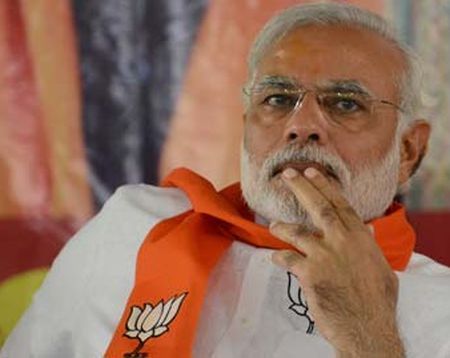 It would be a miracle if demonetisation doesn't extract a political price from the BJP and Modi, says T C A Srinivasa-Raghavan.
It would be a miracle if demonetisation doesn't extract a political price from the BJP and Modi, says T C A Srinivasa-Raghavan.
A myth has developed in India since May 2014 that Prime Minister Narendra Modi has inaugurated a 'presidential' form of government. The reference is to the way he is said to have centralised power in himself and the Prime Minister's Office.
The demonetisation of November 8 is given as the latest example of this. As examples go, it is not a bad one, but the truth is that as far as the centralisation goes, it was Jawaharlal Nehru who started it.
Between 1956 and his death in 1964, all major policies emanated from his office which was called the Prime Minister's Secretariat then.
The only two ministers who really mattered during those years were V K Krishna Menon and T T Krishnamachari. Both were toadies and both caused India enormous grief by endorsing Nehru's whims about the economy and national security.
From 1964 to 1971 the PMO became very much weaker. Indeed, between July 1969 and March 1971 policy power slipped away from the government to the Communist Party of India, which was supporting the minority Congress-I government.
In the 1971 general election Indira Gandhi won massively. She quickly wrested back power from the Communists -- but did not abandon their programmes.
At first power became concentrated in the PMS and then in the PMH (Prime Minister's House) via Sanjay Gandhi. No minister mattered.
During 1977 and 1979, the PMO once again lost its overarching pre-eminence. Morarji Desai faced many challengers, including from his deputy who toppled him and became prime minister for six months.
But from 1980 till 1989 the PMO reigned supreme, first under Indira Gandhi and then under Rajiv Gandhi.
If anything, it became even more powerful after the latter got rid first of Pranab Mukherjee who had been No 2 in Indira Gandhi's Cabinet, and then V P Singh, Arun Nehru and Arun Singh who had been very close to Rajiv.
From 1989 to 2014, the PMO again ceased to be a major force and could be defied. P V Narasimha Rao was challenged by Arjun Singh, N D Tiwari, and, of course, Sonia Gandhi. Even ministers of state didn't feel in awe of him.
Even Atal Bihari Vajpayee could not restore the PMO to its full power.
During his prime ministership from 1998 to 2004 there were too many other power centres and it became a mere nodal point for government.;
As to Manohan Singh? Hush.
Now Narendra Modi has completed 31 months as prime minister. So it is appropriate to ask: Who has done better -- him, his party or his government?
Whatever one may say about that, one thing seems clear. Like Nehru, Indira Gandhi and Rajiv did with the Congress -- and the regional leaders have done with their parties -- he has feudalised the Bharatiya Janata Party.
Today every other leader stands diminished because of the way he manages the party and the government.
In style as well as substance the BJP has become like all other parties, major or minor.
Like Nehru and Indira Gandhi -- not Rajiv -- Modi as a politician and leader has been hugely successful. But like them, his 'policies' have been the opposite.
Many would ask if he has any policies at all and does he not regard sudden shocks to the system as ideal substitutes for them?
So we must also ask: Will what worked in the first half of his term, work in the second half too? Has not the time come to consolidate his innings?
Another question: Has the support that Modi received so far been dented because of this demonetisation thing? It would be a miracle if it hasn't.
But then, equally, that would have happened anyway because halfway through anyone's term, support begins to fray at the edges.
The speed with which it crumbles is, however, very important and can be disastrous if it is too rapid as Rajiv, from 1987, and Indira Gandhi, from 1973, discovered.
His supporters have hailed his dramatic lunges as the bravery of a man who is not afraid to try new things.
His opponents have merely said he is a very foolish man.
Eventually, it is the voter who will decide which of these he is.
Modi is too clever a politician not to realise that he has made a colossal mistake.
Even if it works well for the country eventually, which it will, it may not work so well for him personally over the next two years.
He now has to cope with the irritation of his party people and the anger of the voters. It will be very interesting to see what damage control measures he initiates.











